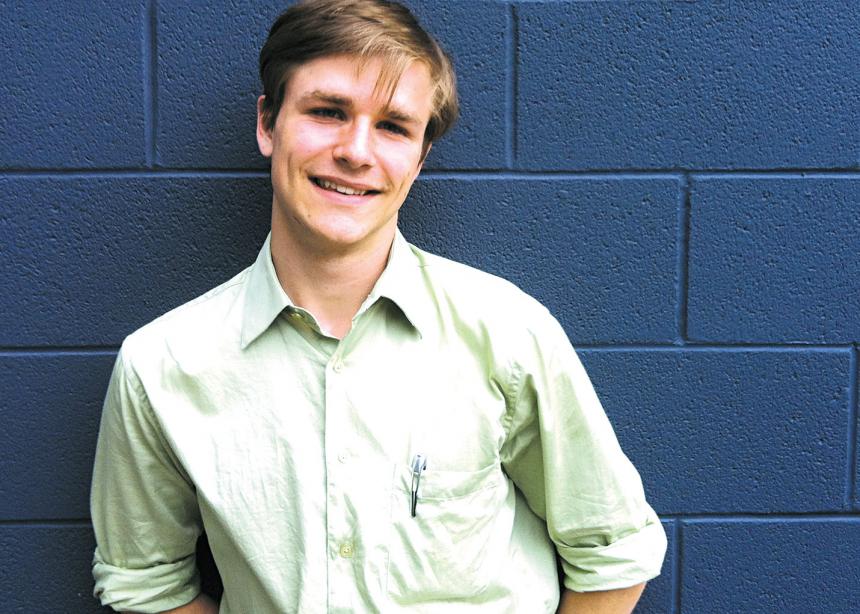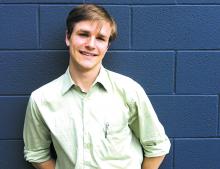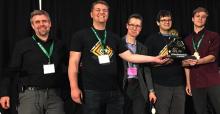Computer programming is a language foreign to most, but not to David Dyck. The 17-year-old Winnipegger is passionate about computers and knowing how they operate.
“I really like understanding how it all works and being able to make a computer do the things I want it to do,” says Dyck, who recently graduated from Westgate Mennonite Collegiate. “It’s always really satisfying to watch a program run . . . or find a bug and realize why something didn’t work.”
Dyck’s passion for computers came in handy this past spring when he and two friends, Jonah Penner and Benjamin Zacharias, competed in the Canadian Cyber Defence Challenge. Held on May 16, 2017, at the RBC Convention Centre, the day-long event pitted 24 student teams against one another in a competition that tested key information technology (IT) skills such as networks, servers and security, along with the soft skills of customer service, professional ethics and communications.
Teams were presented with a fictitious scenario in which they worked as IT professionals for a company whose CEO was embezzling funds from corporate accounts. Students were tasked with finding the source of, and fixing, the security breaches.
Different tasks along the way earned each team points. At the end of the day, Dyck and the Westgate team came out on top, outscoring the second-place team by 60 points. They were surprised to finish in the top spot, especially considering they had no hopes of placing when the day began.
“It was really weird to win, because . . . we went there to learn. We didn’t really go there to win,” he says. “We didn’t prepare a lot beforehand. It was almost surreal.”
The team’s win is that much more impressive given the obstacles they faced throughout the day. Most teams were made up of four students, each working on his or her own laptop, with a teacher supervising them. The Westgate team had only three students, one working laptop and no supervisor.
“It was like writing an eight-hour test,” Dyck says. “Just that level of focus for eight hours was stressful. It was so much fun, though. It was cool.”
Neil Ens, who teaches computer science at Westgate, including an upper-level course that Dyck, Penner and Zacharias were in this past year, says he is happy with how his students did at the competition.
Ens notes that the students decided to enter the contest and garnered Westgate’s support on their own initiative. In the past, Ens has been hesitant to field a team at the Challenge because the level of courses the competition recommends that its participants have completed in order to be competitive are only offered in larger schools.
“I was pretty proud of their accomplishment,” he says, adding that although he could not be at the competition, the team kept him updated on how they were doing via email. “When I found out that they were in the lead, I was a little bit surprised given the level of competition there, but at the same time, knowing the abilities of these students . . . I wasn’t shocked that they were doing really well. David sent me a message after they had won and I felt very happy for them.”
Dyck started programming when he was 12 years old and is largely self taught. “I picked up a book from the library and thought it was really neat,” he says. “My uncle programs, so he introduced me to the concept. . . . I just branched off from there, learning from the Internet or books I could find.”
He is interested in the concept of ethical hacking. Ethical hackers are employed by companies to penetrate networks and computer systems with the purpose of finding and fixing vulnerabilities.
Dyck, who attends First Mennonite Church, says it’s here that his Christian faith comes into play. “It’s an ethical way of [hacking] as opposed to a non-ethical way of doing it,” he says. “Breaking into the system maliciously would be wrong, so approaching it from a non-malicious standpoint is a more religious way to do it.”
This fall, he will enter the University of Manitoba to study computer science. He hopes to pursue a career in cyber-security. “I love learning about how these things work,” he says.




Add new comment
Canadian Mennonite invites comments and encourages constructive discussion about our content. Actual full names (first and last) are required. Comments are moderated and may be edited. They will not appear online until approved and will be posted during business hours. Some comments may be reproduced in print.